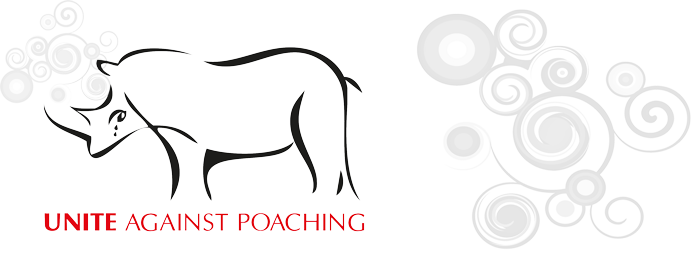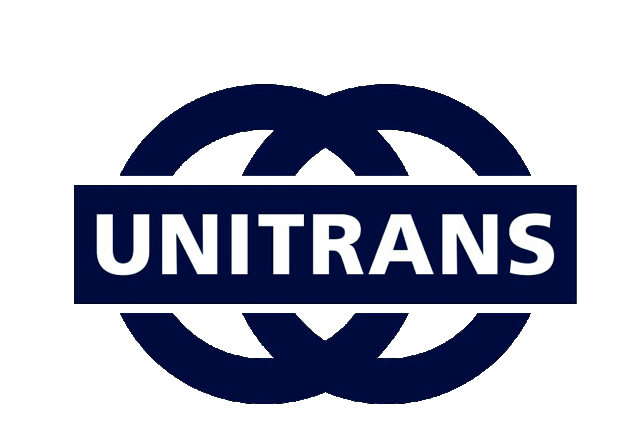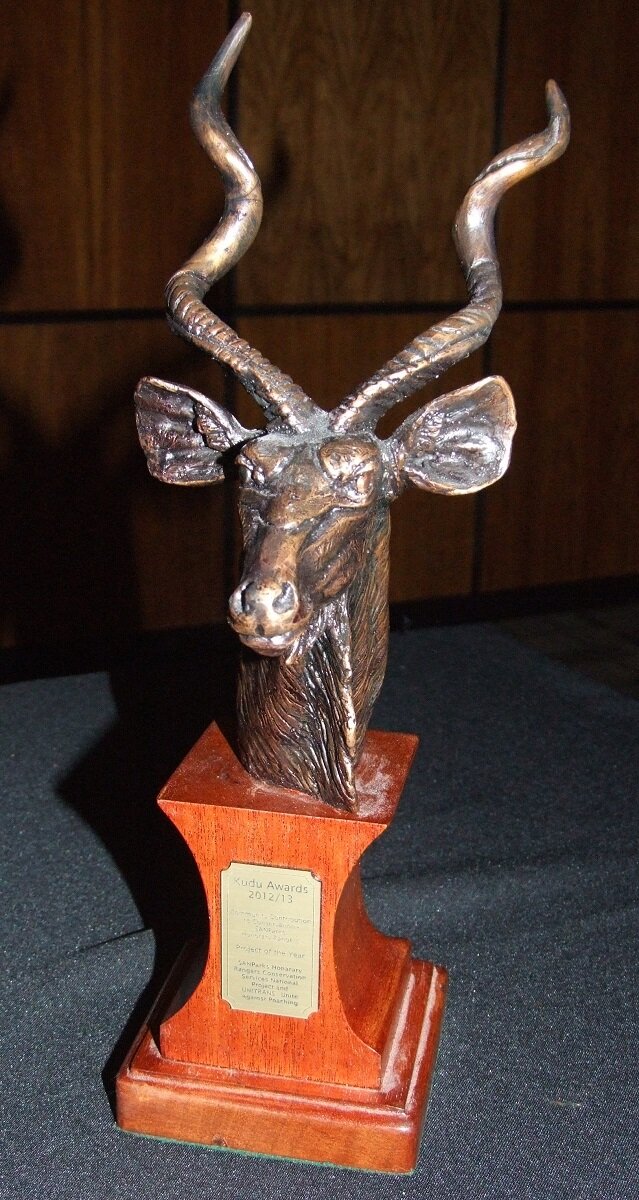5000 potential -poachers annually in Kruger Park
Mar 10 2015- Details
-
An estimated 5 000 people intent on killing rhino for their horns entered the Kruger National Park (KNP) during 2014, says Ken Maggs, KNP chief of staff for special projects.
This “very conservative” estimate was based on the number of tracks observed by rangers in the park during the year. Many poachers’ tracks were washed away during rains.
Speaking the day before World Wildlife Day, Maggs said poachers were changing tactics.
“Five years ago, the predominant weapon used was the older military weapon, AK47, the SKS, and so forth,” Maggs explains.
“But of late we’ve seen an increase in the use of heavy calibre hunting rifles. It’s simply the poacher’s effort to improve the effort versus reward; however we are still seeing lighter calibres.
“We have found silencers on the weapons … Crossbows have also been used in the past, which have not proved effective at all.”
Poachers are 23 years old on average, determined to succeed, and as at home in the bush as the animals they hunt, said Maggs.
Pressure from ground and air patrols made it difficult for poachers to move around during the day, so they were increasingly carrying out their activities at night, he added.
“This makes it difficult for everybody. The poacher isn’t scared of the night. Apart from not having any rules, he’s not really scared of wild animals, and we have the full range here. Walk into an elephant or a pride of lion at night; they are not your friend. This is the person we are up against,” said Maggs.

Meanwhile, confusion reigns in official circles about how many rhino are being poached.
Two senior SANParks staffers recently said 120 rhinos had been poached so far this year in Kruger Park alone. But Environmental Affairs Minister Edna Molewa told the parliamentary portfolio committee 158 rhino had been poached in 2015, 108 of them in the Kruger.
The department had not provided a definitive figure by the time of going to print.
Success for the Unitrans Tracker hounds again!
Feb 12 2015- Details
-
EXCELLENT NEWS!!!!
They have done it once again!
Yesterday the Unitrans Volkswagen Tracker hounds has 2 successful contacts with suspected poachers.
The hounds had long tracks to follow (remember how hot it is in the KNP at present) before the interceptions by the field teams. In both cases suspected poachers were apprehended with firearms and poaching equipment was recovered.
Reports are that during the 2 interactions there was 1 fatality, 1 wounded and arrested and 1 successful arrest.
ALL THIS WITHOUT A RHINO BEING POACHED.!!!
Well done Chico and Kombi!!!
Congratulations to the teams involved and WOW we are so incredibly proud of the success of the Unitrans Volkswagen Tracker Hound Team.

Game Ranger's Association of Africaappeals to Presidency during SONA 2015
Feb 09 2015- Details
-

The GRAA calls on the The Presidency of the Republic of South Africa to fully acknowledge during the #SONA2015 the onslaught that our rangers are facing while they attempt to protect not only South Africa’s rhino but its natural heritage in general.
The GRAA acknowledges the role played by the dedicated field personnel who are attempting to keep this situation under control. The sacrifices that these men and women are making in order to ensure the preservation of our natural resources deserve further recognition and appreciation. The debt we owe these dedicated and brave conservationists and their families can never be repaid.
The GRAA calls on President Jacob Zuma and the South African government to fully acknowledge the onslaught that our rangers are facing while they attempt to protect not only South Africa’s rhino but its natural heritage in general.Read more: Game Ranger's Association of Africaappeals to Presidency during SONA 2015
SAPS step up anti poaching strategy in Kruger National Park
Feb 04 2015- Details
-
The Portfolio Committee on Police is in the Kruger National Park where it wants to assess SAPS strategies on fighting rhino poaching.
On Monday, the committee visited the Lebombo border post (Mozambique border) where it was shocked to find that many km's of security fence were no longer in place. They also found a serious lack of manpower and technology.
Committee chairman, Mr Francois Beukes has called National Police Commissioner Ms Phiyega and her senior management team to a meeting on 18th Feb to explain how SAPS intends to meet challenges at Lebombo and other border posts.The Portfolio Committee on Police says it will kick-start a process of ensuring that South Africa has stricter border controls by calling the National Police Commissioner to the meeting of 18 February where the National Commissioner and her senior management team would explain how the South African Police Service plans to address challenges faced by the country's ports of entry.
"The matter of having tighter controls at our borders is a non-negotiable. It is a matter of National Security and as such the Committee will not compromise on making sure that security controls at our borders are heightened," said Mr Francois Beukman.
The Committee said this during its oversight visit to the Lebombo border post in Mpumalanga yesterday, where it heard of challenges experienced by police officers working at this border gate.
According to Mr Beukman, the 18 February meeting will seek responses on how SAPS intends addressing shortage of staff, technology as well as inadequate facilities at Lebombo border post. "We will also call the Director-General of Public Works to be part of this meeting as some of the challenges we picked up here fall squarely on their door-step."Read more: SAPS step up anti poaching strategy in Kruger National Park
Rhino poaching statistics for 2014
Jan 22 2015- Details
-
The official tally of rhinos poached in 2014 is a staggering 1215.
This is such a tragedy and we are all horrified at this.
During the media briefing the Minister echoed that this was indeed worryingly high.
The number of poachers arrested during 2014 has increased to 386 and the Minister expressed her thanks to all those involved in these arrests.
Some of the anti poaching measures discussed included:
-Intensive Protection Zones for rhinos within the KNP. Some rhinos have already be relocated here.
-The disruption of criminal syndicates is being undertaken and are already yielding results.
-There has been significant funding in support of the forensic work undertaken by RhODIS
-There will be more training of magistrates to ensure better understanding of the severity of rhino poaching. There is work towards making rhino poaching a priority crime and they are working towards pre-determined sentences for rhino poaching.
- A need to co operate internationally to reduce the demand for rhino horn in consumer countries.
-Moving rhinos to alternate locations within National Parks, private reserves as well as neighboring countries. ( 56 rhinos have already been moved and it is anticipated that about 200 rhinos will be relocated from Kruger this year)
-Collaborate with Interpol, specifically the Wildlife Crime Working group.
-The Green Scorpions will ensure CITES compliance at ports of entry and exit. The aim is to reduce the illicit wildlife trade and contribute to more arrest and prosecutions to poaching related activities, as well as corruption.






 Mitec Solutions
Mitec Solutions